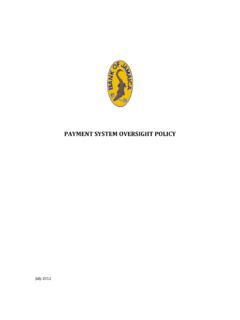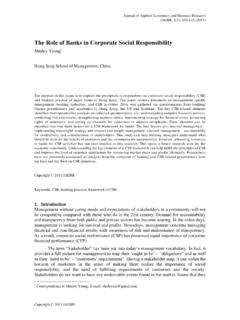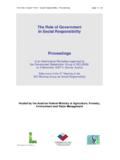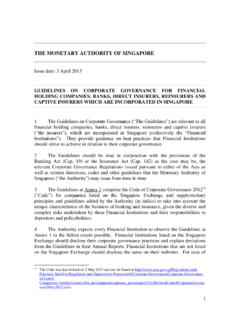Transcription of Corporate Governance Standard - Bank of Jamaica
1 Standard of Best Practice for Effective Corporate Governance of Deposit-Taking Entities Bank of Jamaica All Rights Reserved July 2008. Section I. Definition and Purpose Introduction and Definition 1. The long-term success of any institution is dependent on several factors including a sound business strategy, quality assets, a market for its products and services, access to capital and a sound system of internal controls and risk management. Central to all these factors is a robust Corporate Governance framework. 2. The Organization for Economic Co-operation and Development (OECD) 1 defines Corporate Governance as involving a set of relationships between a company's management, its board, its shareholders and other stakeholders.
2 Corporate Governance also provides the structure through which the objectives of the company are set and the means of attaining those objectives and monitoring performance are determined. Good Corporate Governance should provide proper incentives for the board and management to pursue objectives that are in the interests of the company and shareholders and should facilitate effective monitoring.. 3. Sound Corporate Governance is critical for deposit-taking institutions (DTIs) in particular, given the pivotal role they play in a country's economic development in: a.
3 Facilitating the efficient movement of funds between savers and investors , facilitating effective intermediation;. b. Providing financial services and access to a wide cross-section of the population; and c. Facilitating access to the payment systems. Although DTIs, like other companies, utilise their capital to support operations, most of the funds put at risk are not their own, but belong to their creditors, in particular depositors. DTIs therefore have a fiduciary responsibility to protect depositors' funds and the successful execution of this responsibility is largely dependent on how well these entities are governed.
4 The failure of a deposit-taking financial institution, as a consequence of poor Governance will affect not only its own depositors and stakeholders, but may also have a contagion impact on the banking sector as a whole which may threaten the stability of the entire financial system. 1. The Organization for Economic Development (OECD) is an international organization formed to provide a forum for governments to compare and exchange policy experiences, identify good practices and promote decisions and recommendations. The mission of the OECD is to help governments and society reap the full benefits of globalization, while tackling the economic, social and Governance challenges that can accompany it.
5 There are currently thirty (30) member countries. SBP Corporate Governance Page 1 of 38. Bank of Jamaica July 2008. 4. The fundamental objectives of Corporate Governance in financial institutions are to ensure effective and proper strategic guidance of the entity, to establish a balance of power between the institution's governing and controlling bodies and to ensure that the organization is operating in a safe and sound manner. It therefore focuses on the quality of oversight and direction provided primarily by the shareholders, board and management - and the relationships among these groups.
6 Other key elements of sound Corporate Governance involve : a. Establishing well articulated objectives and Corporate values;. b. Setting and enforcing clear assignment of responsibilities, decision-making authority and accountabilities that are appropriate for the entity's risk profile;. c. Placing constraints on management power and ownership concentration while simultaneously providing incentives to board, management and employees to act in the best interest of the company, its depositors and shareholders;. d. Establishing strong risk management and internal control systems.
7 E. Ensuring transparency and appropriate information flows internally, as well as to the regulator and the public. 5. Good Governance plays a crucial role in achieving and preserving public trust and confidence in the deposit-taking system, which is essential for the proper functioning of the financial sector and the economy as a whole. It is also a major determinant in the maximization and maintenance of the value of the entity's shares and allows for efficient and effective regulation. 6. Deposit-taking businesses are inherently risky as they take in deposits, primarily on demand, and on-lend them, largely on a long-term basis without the certainty of repayment.
8 With the advent of globalisation, innovations in financial products and channels of delivery, technological advances, growing competitiveness and complexity of financial operations, the risks to which these entities are exposed have significantly increased, simultaneously heightening the need for good Governance . SBP Corporate Governance Page 2 of 38. Bank of Jamaica July 2008. 7. Further, the growing trend towards the establishment of DTIs within conglomerate structures, which in many instances extend beyond geographical borders, has led to the blurring of responsibilities and accountabilities within the Governance framework for the group.
9 These structures sometimes heighten risk exposures and pose significant challenges to effective Governance . 8. Fundamental deficiencies within the Governance framework evidenced in several Corporate failures (such as ENRON and WORLDCOM), have led to an increased demand for Corporate Governance enhancements within corporations, including financial entities. The OECD and the Basel Committee 2 are two international organizations that have since issued minimum principles for effective Corporate Governance , whilst other Standard setters and local jurisdictions have been similarly enhancing requirements for effective Governance of entities.
10 Consequently, new initiatives and requirements have evolved such as: a. Incorporating Corporate Governance variables into credit rating methodologies;. b. Legislating the accountability of Board of Directors and Corporate officers, including provisions for facing criminal charges for breaches of their fiduciary responsibility;. c. Restricting, and in certain instances, prohibiting company lending to senior executives;. d. Increasing representation of independent, non-executive directors on company/entity boards and in particular on critical board committees ( Audit) to enhance the effectiveness and the independence of the oversight function.










